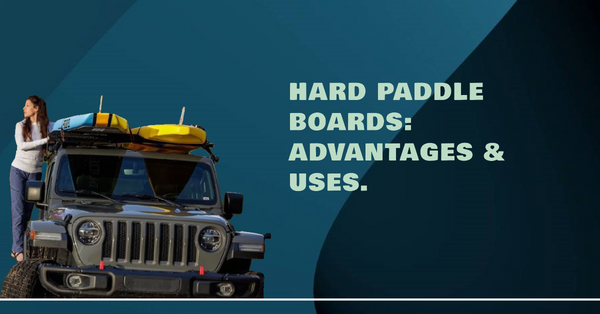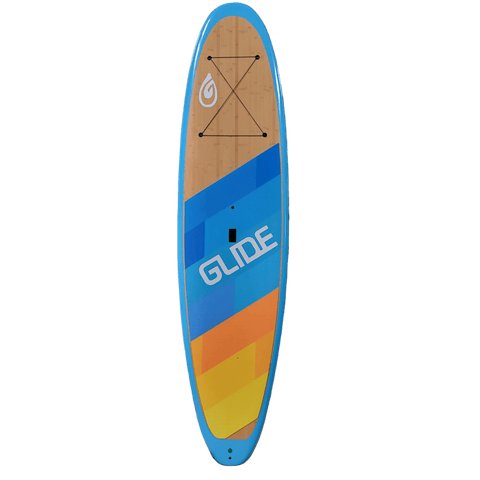
Hard Paddle Boards: Advantages & Uses
If you're looking to take your water sports experience to the next level, hard paddle boards are a fantastic option. Unlike their inflatable counterparts, these boards offer superior rigidity, stability, and durability, making them ideal for more demanding activities like surfing, racing, and touring. In this blog post, we'll cover everything you need to know about hard paddle boards – from their basic structure and material composition to their enhanced performance features and specific use cases. We'll also compare them with inflatable paddle boards and discuss why they might be preferred over the latter. Finally, we'll highlight how Glide Paddle Boards stand out in this category and why they're worth considering if you want a top-quality hard paddle board that delivers on all fronts. So get ready to ride the waves like a pro with our ultimate guide to hard paddle boards!
Embarking on a journey with a paddle board under your feet opens up a world of adventure, where the ripple of the water beneath becomes a symphony of nature's call. For those enchanted by the allure of the waters, the choice of a stand up paddle board (SUP) is more than a preference—it's a partnership between the paddler and the vast, open sea. Today, let's dive into the essence of hard paddle boards, the champions of durability, performance, and the pure joy of paddle boarding.

The Heart of Paddle Boarding: Embracing the Hard Paddle Board
At the core of paddle boarding lies the hard paddle board—a masterpiece crafted from the resilient bonds of fiberglass, epoxy, and the spirit of the sea. Known for their unmatched rigidity, these boards serve as the steadfast companions of paddlers seeking the thrills of slicing through waves, embarking on serene tours, or even capturing the essence of tranquility through SUP yoga. The unparalleled stability and control offered by a hard paddle board make it the go-to choice for enthusiasts who crave the authentic pulse of paddle boarding.
The Unyielding Spirit of Solid Boards
Imagine a board that stands the test of time and tide—this is the promise of a hard paddle board. Constructed with layers of fiberglass and epoxy around a core of unwavering foam, these boards are the epitome of durability and resilience. From navigating the playful toss of small waves to enduring the silent challenge of still waters, the hard paddle board is a beacon of reliability. Its streamlined design not only carves efficiency into every stroke but also offers paddlers the joy of speed, making every journey a tale of exhilaration.
Crafted for Performance, Designed for Speed
In the realm of paddle boarding, where every wave is a new challenge and every calm a moment of reflection, the hard paddle board shines as the paragon of performance. Its rigid structure translates the paddler's energy directly into motion, allowing for swift, agile maneuvers that dance across the water's surface. Whether it's a race against the wind or a peaceful glide over mirror-like waters, the hard paddle board stands as a testament to the spirit of adventure that propels every paddler forward.
The Endurance of Legends: Durability Meets Lifespan
Beyond the thrill of speed and the promise of stability lies the cornerstone of any paddleboard—the guarantee of enduring the adventures that await. Hard paddle boards, with their sturdy construction and resistance to the elements, offer a lifespan that inspires tales of endless summers and winters conquered. They are the faithful companions of those who seek not just the excitement of the now but also the promise of tomorrow's adventures.
Choosing Your Companion: The Quest for the Perfect Hard Paddle Board
The journey to selecting the perfect paddle board is akin to choosing a partner for the adventures that lie ahead. It involves considering the harmony between the paddler's aspirations and the board's capabilities. For the thrill-seekers, the surf-ready agility of a hard paddle board offers an unmatched experience. Racers will find their match in the speed and precision that these boards deliver. And for those whose adventures lead them into the tranquil embrace of nature, the stability and ease of a hard paddle board make it the ideal choice.
The Legacy of Hard Paddle Boards: Glide into the Horizon

As we navigate the waters of choice and preference, the legacy of hard paddle boards as the stalwarts of the paddle boarding world remains undisputed. They are the bearers of the paddle boarder's spirit—unyielding, adventurous, and ever ready to explore the vastness of the waters. In choosing a hard paddle board, one does not just select a piece of equipment; one chooses a companion for the journey of a lifetime—a journey that promises the freedom of the seas and the joy of discovery.
In the dance of waves and the whisper of the wind, the hard paddle board stands as a testament to the enduring spirit of adventure that defines the essence of paddleboarding. So, as you stand at the brink of your next journey, remember—the choice of a hard paddle board is the first stroke in the story of your adventure. Embrace the journey, for the waters await.


